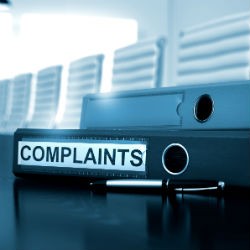 In today’s world, handling employee complaints is more important—and potentially more costly—than ever before. The inability to effectively manage concerns leads to low morale among your staff, negatively impacts company productivity, and could even result in legal action against your business.
In today’s world, handling employee complaints is more important—and potentially more costly—than ever before. The inability to effectively manage concerns leads to low morale among your staff, negatively impacts company productivity, and could even result in legal action against your business.
A lawsuit against your company can become incredibly expensive whether you win or lose your case. Here’s how you can implement a plan for addressing both major and seemingly minor problems before they impact your business.
1. Address the emotional state of the employee making the complaint.
Encourage the employee to literally walk with you to help dissipate an adrenaline rush if present. If the employee is calm, tell them you would like to meet to discuss the issue. Schedule the meeting as soon as possible to show your worker you prioritize it—and them.
2. Gather the facts and opinions.
Then, separate the two as well as you can. Take lots of notes during the discussion. Ask questions regarding all aspects of the concern. Cover the who, what, when, where, why, and how of the situation. Get the names of other staff members involved or witnesses who can give you more information regarding the issue.
3. Reassure the worker.
Advise the worker that you will investigate the situation, speak to parties, and decide how to best handle the complaint. Then, explain you will be as thorough and as prompt as possible.
4. Interview everyone involved.
Allow everyone to tell their stories and take notes. Listen actively to their accounts, and then weigh them for veracity and authenticity. Compare all the testimonies for similarities and contradictions. Ask pertinent questions and dig deep to uncover the details.
5. Judge the weight of the issue and consider how it reflects on and influences your company.
It might be a relatively minor issue, such as a personal matter, which can be addressed simply with a schedule change or some other adjustment. On the other hand, there could be a major problem, such as sexual harassment, which you must address quickly and within the parameters of the law. Seek legal counsel in these cases.
6. Reveal your decision to the employee who registered the complaint.
Explain your research and how you arrived at your solution. Outline the plan you made to resolve the manner. Elicit feedback to your response. If all is well, proceed to implementing the plan. If the associate is unhappy with the decision, listen and respond appropriately. You can stay firm in your decision or reevaluate as necessary.
7. Document the complaint, the investigative process, and the resolution in personnel files.
Ask the employee to sign their copy. Check in again with the employee in five to 10 days for feedback as to how the resolution is working. Assess your company’s entire morale and productively in response to your handling of the issue.
In Conclusion
Don’t avoid employee concerns—even when you believe there is no real issue. The matter brought to you by a member of your staff deserves your focus, empathy, and most importantly, your action.